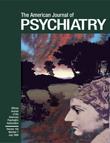Risperidone Monotherapy for Mania and Depression
To the Editor: Recently, risperidone (alone or, mostly, in combination with other mood stabilizers) has been tried in the treatment of bipolar disorder (1, 2). Nevertheless, its effects on mood seem hardly predictable: it has antimanic effects in some patients (1, 2) but mania-inducing (or antidepressant) effects in others (2). We describe a patient with bipolar disorder in whom risperidone monotherapy exhibited marked efficacy for his sequential manic and depressive states.
Mr. A, a 27-year-old man of Chinese descent, was physically healthy and did not abuse substances. About 1 year ago, he was hospitalized for his first episode of DSM-IV psychotic mania. Elevated moods, lessened need for sleep, hyperactivity, pressured speech, flight of ideas, grandiosity, and visual, mood-congruent hallucinations significantly impaired various areas of functioning. Physical examinations, laboratory tests, drug screening, chest X-rays, an ECG, and an EEG all produced negative results. In addition, his elder brother was also a victim of bipolar disorder. Mr. A and his father gave written informed consent for him to receive risperidone monotherapy; his dose was titrated to 3 mg b.i.d. over 3 days. Both psychotic and mood symptoms vanished within 3 weeks; he was then transferred to our outpatient department with the same drug regimen.
Two weeks later, Mr. A abruptly discontinued his medication because of a lack of full insight; after 6 days, a less severe manic state (without psychotic features) returned. Five days later, risperidone alone (3 mg b.i.d.) was reinstituted, abating his mood turmoil over 1 week. Unfortunately, 1 month later, he again discontinued his medication; a DSM-IV major depressive episode with melancholic features ensued 1 week later. Distinct depressed moods, significant anorexia, early morning awakening, loss of energy, marked psychomotor retardation, loss of pleasure in all activities, excessive guilt, and feelings of hopelessness caused drastic distress. After another 2 weeks, the same monotherapy alleviated the depressive state within 1 week. Three weeks later, Mr. A halted the medicine for a third time. Thereafter, he was free of psychotic and mood symptoms for 9 months, until another major depressive episode (with similar symptoms) developed. Two weeks later, the earlier treatment strategy curtailed this episode over 1 week. No adverse drug reaction ever emerged; no other medication, even as an adjunct, was coadministered throughout.
To our knowledge, this is the first report of risperidone monotherapy for both manic and depressive episodes of bipolar disorder. Although Mr. A’s mood fluctuation might merely reflect the natural course of his illness, the temporal relationship with risperidone’s (re)initiation or suspension suggests otherwise. Rigorous studies are needed to examine this preliminary observation.
1. Freeman MP, Stoll AL: Mood stabilizer combinations: a review of safety and efficacy. Am J Psychiatry 1998; 155:12–21Link, Google Scholar
2. Lane HY, Lin YC, Chang WH: Mania induced by risperidone: dose related? (letter). J Clin Psychiatry 1998; 59:85–86Crossref, Medline, Google Scholar



